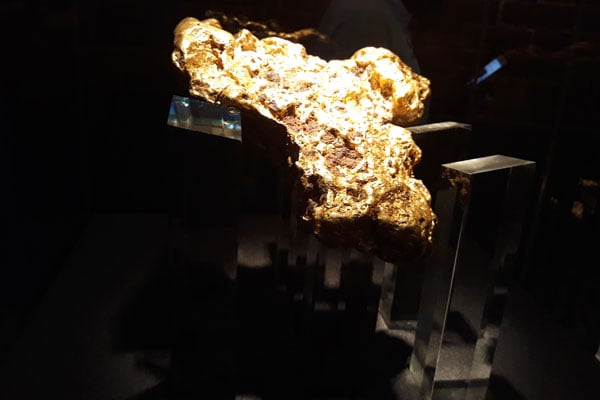Prime
Where will gold come from to feed Uganda’s new refinery?

President Museveni (with hat) looks at gold samples during the refinery launch in Entebbe on Monday. PPU PHOTO
What you need to know:
- Unknown. Uganda is not a known large scale producer of gold.
Kampala.
Uganda’s gold exports have continued to baffle many. As at the end of 2016 the exports rose to $336m (Shs1.2 trillion), rivaling coffee and the sole reason Uganda’s exports rose 1 per cent. This is the closest any single export has come close to coffee in many years.
One of the reasons for the rise in gold exports is because of the value being added to the gold by the African Gold Refinery, a privately owned refinery that was launched by President Museveni on Monday.
It accounts for at least 90 per cent of the gold that was exported out of the country in 2016 and the final half of 2015.
Uganda is not a known gold producer on a large scale to put up numbers seen in the export statistics.
The African Gold Refinery, a $15m facility located in Entebbe, Wakiso District has been sourcing gold from around the Great Lakes Region before they export to 99.99 per cent purified gold that has a higher value.
“The gold we are exporting is from all over the region. We are also in the process of getting a mineral dealer license in Uganda,” Mr Alain Goetz the CEO, African Gold Refinery.
The disclosures on the origin of that gold are still farfetched. The refinery officials say they buy from the mineral dealers who bring the gold in the country.
However, Uganda’s import statistics for the last two years do not seem to show records of large quantities of gold entering the country. The research department at Bank of Uganda (BoU) notes that they do not know the origin of the gold that Uganda is importing.
That raises concerns about where Uganda may be getting its gold from.
“It is not our job to know the source of the gold. That is not our role as refiners. That is the role of the customs officials on the Ugandan side,” Dr Adam Mugume, the executive director of research BoU, told reporters on the sidelines of the launch.
According to Uganda Revenue Authority officials, they have seen gold entering the country but that has not translated into revenues.
This, they say is because some of the gold is smuggled in the country. The government missed out on royalties valued at Shs45 billion in the financial year 2015/16.
The source of Uganda’s gold has, in particular, been a concern for human rights campaigners.
“Uganda’s gold sector is shrouded in mystery – you have to ask who is really benefitting. The gold trade was worth $200 million to the Ugandan economy last year but there are no official figures on where the gold came from or where it is going,” said Mr George Boden, the campaign leader at Global Witness.
He added: “This raises serious questions about whether gold that may have funded conflict and human rights abuses in Eastern DRC and South Sudan could be entering the international supply chain and whether the right taxes are being paid.”
The situation could even get more complex for campaigners if US president Donald Trump goes ahead to repeal the Dodd-Frank Act that allowed a certification process in order to ensure that minerals are not used to fund conflict.
This meant that for gold to reach the international market, its source would be known. Repealing this law would end this process. According to Goetz, the law was restrictive and makes the gold processing procedure very expensive.
“It is very expensive to comply with this law. That law doesn’t make any sense for us. Why do they have to impose such restrictions on countries in Africa?” he says.
Ending smuggling
Uganda is considered a transit hub for smuggled gold from the DRC and parts of Tanzania. Also, the small domestic quantities produced by illegal and small-scale miners in East Africa is smuggled out of the country to refineries in Dubai.
On Monday, President Museveni said he wanted the tax/royalties lifted to encourage gold miners to take their gold to the newly African Gold Refinery located in Entebbe.
He said the tax was encouraging the smuggling of gold out of the country.
“Therefore I am going to remove that royalty. The people of Mubende should bring our gold to the refinery. You were scared of the tax but now we have removed it. The royalty for those in transit has also been removed. There will be no excuse for anybody not to bring their gold to the refinery,” President Museveni said at the launch of the African Gold Refinery. This would accord the refinery with supplies it needs.
The mineral trade
Illegal. In 2010, Uganda signed the Lusaka Declaration on Illegal Exploitation of Natural Resources along with ten other countries in the region. This commits countries to clean up the regional mineral trade by, among other things, implementing Organisation for Economic Co-operation and Development (OECD) Due Diligence Guidance. However, Uganda has not followed through with this commitment in full. While the Democratic Republic of Congo and Rwanda have already brought the OECD Guidance into national law to help ensure companies operating in their gold sectors source and trade minerals responsibly.




